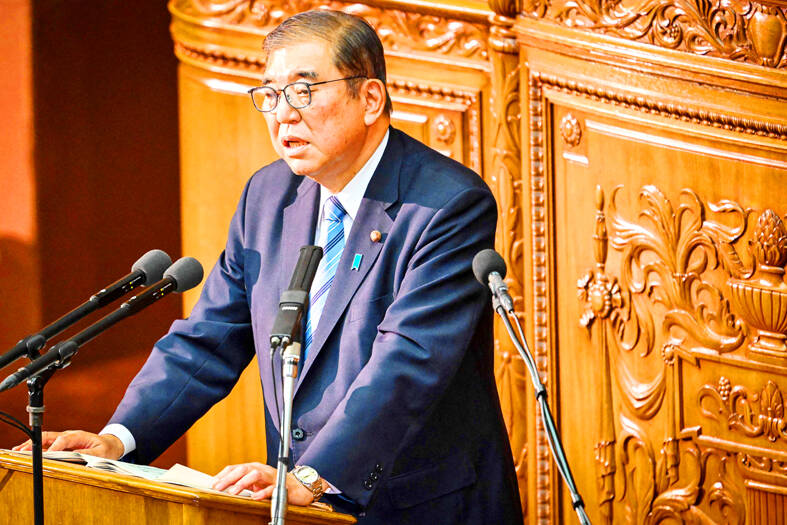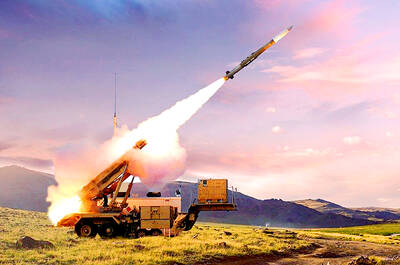Japanese Prime Minister Shigeru Ishiba yesterday said that he would have “frank discussions” with US president-elect Donald Trump, saying that cooperation between them was vital to ensuring a “free and open Pacific.”
“I will have frank discussions with incoming president Trump and lead the alliance to new heights,” Ishiba said in parliament in a key policy address. “Naturally, the US has its own national interest and Japan has its own national interest. That is why I think exchanging opinions frankly and enhancing the national interests of both countries in a synergetic way will help realize a free and open Indo-Pacific.”
Beijing has displayed increasingly assertive behavior in territorial disputes in the Asia-Pacific region, including around Taiwan.

Photo: AFP
Tokyo is also alarmed by nuclear-armed North Korea’s expansion of its missile activities. Trump met North Korean leader Kim Jong-un during his first term.
Ishiba, a self-confessed defense “geek,” has called for the creation of an Asian NATO with its principle of an attack on one being an attack on all.
“The Japan-US security alliance is the foundation of Japan’s diplomacy and security,” Ishiba said. “At the same time, however, the United States receives great strategic benefits from the existence of facilities and areas [controlled by] US forces in Japan.”
In Trump’s first term, then-Japanese prime minister Shinzo Abe appeared to have warm personal relations with the US president, playing golf together several times.
Ishiba and the US president-elect had what the Japanese prime minister called a “very friendly” telephone conversation after Trump’s election win earlier this month.
Key allies Japan and the US are each other’s top foreign investors, and 54,000 US military personnel are stationed in Japan, mostly in Okinawa, east of Taiwan.
Japan has been shedding its strict pacifist stance, moving to obtain “counterstrike” capabilities.
US President Joe Biden and Ishiba’s predecessor, former Japanese prime minister Fumio Kishida, announced a “new era” in defense in April.
Japan is already in the process of doubling its military spending to the NATO standard of 2 percent of GDP, but Trump’s “America First” approach could mean that in his second term he could provide less cash and press Japan to do more.
Trump also caused panic among some of the biggest US trading partners on Monday when he said he would impose tariffs of 25 percent on Mexican and Canadian imports, and 10 percent on goods from China.
Many Japanese exporters, including automakers Toyota and Honda, have plants in Mexico and in Canada. Both firms’ shares fell sharply this week.
Japanese government officials have declined to comment on Trump’s tariff threats, and Ishiba did not address the issue directly yesterday, but Masakazu Tokura, chairman of Japan’s most influential business organization, Keidanren, on Tuesday said that the impact on Japanese firms could be “enormous.”
Trump could also press Japan to join expanded US efforts to limit exports to China, such as semiconductor equipment and artificial intelligence chips, which could hurt Japanese firms.

OPTIMISTIC: The DGBAS sharply upgraded its GDP growth estimate from 3.54 percent to 7.71 percent after the Taiwan-US trade agreement signing and given AI optimism The US imported more from Taiwan than China for the first time in decades, as US President Donald Trump’s tariffs reshape trade flows while a global boom in artificial intelligence (AI) fuels demand for tech products. US purchases of goods from China plunged almost 44 percent in December last year from 2024 to US$21.1 billion, US Department of Commerce data showed on Thursday. By contrast, shipments from Taiwan more than doubled during the same period to US$24.7 billion. The soaring Taiwanese shipments to the US reflect the huge expansion in supplies of chips and servers for AI companies, which has completely changed

NON-NEGOTIABLE: The US president’s action ran counter to one of the US’ ‘six assurances’ on not consulting China about arms sales to Taiwan, US lawmakers said US President Donald Trump’s admission that he is discussing arms sales to Taiwan with Chinese President Xi Jinping (習近平) is “alarming and a blatant violation of US policy and the six assurances,” US Representative Ro Khanna said on Tuesday. Trump on Monday said he would decide soon on whether to send more weapons to Taiwan, after Xi warned him not to do so. “I’m talking to him about it. We had a good conversation, and we’ll make a determination pretty soon,” Trump told reporters aboard Air Force One when asked about warnings raised by Beijing during a phone call with Xi over

US and Chinese fighter jets briefly faced off above waters near the Korean Peninsula this week, Yonhap News agency reported, marking a rare confrontation in that area between the two superpowers. About 10 US fighter jets on Wednesday departed an airbase in Pyeongtaek, South Korea, for drills above international waters off South Korea’s western coast, the news outlet cited unidentified military sources as saying. While the US planes did not enter China’s air defense identification zone, Beijing scrambled planes as they neared that region, the report said. “The Chinese People’s Liberation Army organized naval and air forces to monitor and effectively respond

VACILLATING? Some US officials are concerned that Trump’s April visit to Beijing might be affected if Washington pushes through additional weapons sales to Taiwan A major US arms sales package for Taiwan is in limbo following pressure from Chinese President Xi Jinping (習近平) and concerns among some US officials that greenlighting the deal would derail US President Donald Trump’s upcoming visit to Bejing, the Wall Street Journal (WSJ) reported on Wednesday. Trump on Monday said that he would decide soon on whether to send more weapons to Taiwan, after Xi warned him not to do so. “I’m talking to him about it. We had a good conversation, and we’ll make a determination pretty soon,” Trump told reporters aboard Air Force One when asked about warnings raised